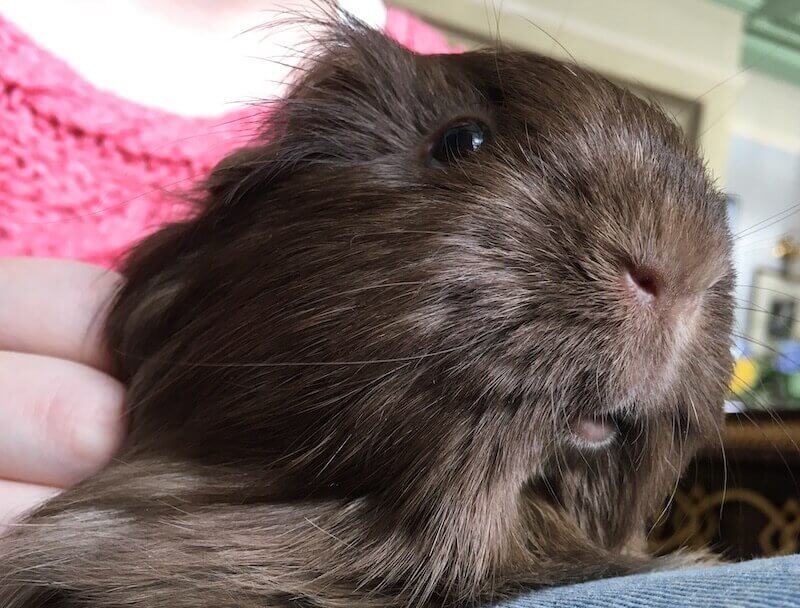Do guinea pigs fart?
Have you ever wondered if guinea pigs fart?
These small, adorable creatures are known for their gentle nature and playful behavior, but like all animals, they have digestive systems that can lead to some interesting bodily functions.
Farting, or passing gas, is a normal part of life for many animals, including guinea pigs.
Their diet, which mainly consists of hay, vegetables, and pellets, can sometimes cause them to produce gas.
While it might seem a bit surprising or amusing, it’s important to understand that guinea pigs’ digestive systems work similarly to those of other herbivores, making farting a natural occurrence.
Here why do fart smell worst in the shower?
Do guinea pigs fart?
Yes, guinea pigs do fart! Like most herbivores, guinea pigs have a digestive system that processes fibrous foods, such as hay, vegetables, and pellets.
This type of diet can produce gas as food breaks down in their intestines. The gas is expelled as flatulence, commonly known as farting.
It’s a natural process for guinea pigs, just like it is for many other animals. However, guinea pigs tend to be quieter than some other pets, so you may not always notice the sounds.

While farting is normal, excessive gas can sometimes indicate digestive issues, like an imbalance in their diet or problems with their gut health.
If your guinea pig seems to be experiencing discomfort, bloating, or changes in behavior, it’s a good idea to consult a veterinarian.
Overall, a balanced diet and proper care can help minimize digestive upset and keep your guinea pig healthy and happy.
Is it normal for my guinea pig to fart?
Yes, it is normal for your guinea pig to fart. Like other herbivores, guinea pigs have a digestive system designed to process high-fiber foods, such as hay, vegetables, and pellets.
As the food breaks down in their gut, it can produce gas, which is then expelled as flatulence.
This is a completely natural process, and occasional farting is a sign that their digestive system is functioning properly.
Here, why do may dog fart smell so bad?
However, if you notice excessive or particularly smelly gas, it could be a sign of digestive upset or a dietary imbalance.
Guinea pigs are sensitive to changes in their diet, and foods that are too rich or not suited for them can lead to more gas or bloating.
If your guinea pig seems uncomfortable, is experiencing changes in behavior, or shows signs of bloating, it’s best to consult a veterinarian to rule out any underlying health concerns.
Are guinea pigs smelly?
Guinea pigs themselves are not inherently smelly, but their living environment can become unpleasant if not properly maintained.
These small animals are clean and groom themselves regularly, but they do produce waste that can lead to odor if not cleaned up frequently.
Their cages should be cleaned regularly, at least once a week, and bedding should be changed to prevent the buildup of urine and feces.
Guinea pigs’ diet can also influence the scent. Foods high in sugar or certain vegetables, like broccoli, can cause stronger-smelling urine or gas. Additionally, male guinea pigs, especially if not neutered, can have a stronger odor due to scent glands.
By providing a clean habitat, regular grooming, and a balanced diet, you can minimize odors and keep your guinea pig smelling fresh. With proper care, guinea pigs are relatively odor-free and make great pets!
How to get gas out of a guinea pig?
If your guinea pig is experiencing gas or bloating, it’s important to address it promptly, as it can cause discomfort or more serious health issues. Here are some steps to help relieve gas:
- Check their diet: Avoid feeding gas-producing foods like cabbage, broccoli, or too many pellets. Stick to a balanced diet of hay, fresh vegetables, and small amounts of fruit.
- Encourage movement: Gently encourage your guinea pig to exercise. Physical activity helps move food through their digestive system and can relieve gas. Try placing them in a safe, open space to roam.
- Massage their abdomen: Gently massaging their tummy in a circular motion can help move gas through their digestive tract. Be very gentle to avoid causing stress.
- Consult a vet: If your guinea pig’s gas persists or they show signs of distress, such as lethargy, lack of appetite, or bloating, consult a veterinarian for further treatment.
Proper care and a balanced diet can prevent gas in guinea pigs.
Do guinea pigs like to be held?
Guinea pigs can enjoy being held, but they need to be handled with care and patience. Unlike some pets, they are not naturally inclined to be held for long periods, as they are prey animals by nature and can feel anxious or stressed if not handled gently.
Here, are protein farts real?
However, many guinea pigs can form bonds with their owners and enjoy brief, calm cuddling sessions once they become accustomed to being handled.

To make holding more comfortable for your guinea pig, always support their body fully, holding them gently but securely.
Let them feel safe by keeping their feet on a stable surface or cradling them in your arms. It’s important to start slowly, especially if the guinea pig is new to you, and allow them to get used to being handled in a stress-free environment.
With time and positive reinforcement, guinea pigs can learn to enjoy being held and spending time with their owners.
9 Reasons why guinea pigs fart
1. Diet High in Fiber
Guinea pigs are herbivores, and their diet mainly consists of fiber-rich foods like hay, vegetables, and pellets.
High-fiber foods are essential for their digestion, but they can also cause the production of gas as the food breaks down in their intestines.
The fiber is fermented by bacteria in the gut, which can produce gas as a byproduct. While this process is natural, excessive gas can sometimes result in farting. A balanced diet is crucial to avoid digestive issues and reduce the chances of excessive gas.
Ensuring that the guinea pig gets the right type of fiber and avoiding sudden dietary changes can help minimize farting.
2. Consumption of Gas-Producing Vegetables
Certain vegetables can cause guinea pigs to produce more gas. Foods like broccoli, cabbage, kale, and cauliflower are known to produce gas during digestion.
These vegetables contain complex carbohydrates that are harder for guinea pigs to digest, leading to fermentation in their intestines. While these vegetables are nutritious and should be fed in moderation, excessive consumption can lead to bloating, discomfort, and farting.
It’s important to introduce these foods gradually to observe any negative effects on digestion and to limit them if gas production becomes excessive.
Here, can a fart give you pink eye?
3. Ingestion of Air
Guinea pigs may ingest air while eating or drinking, which can result in gas buildup in the digestive tract.
This can happen if a guinea pig eats too quickly or is stressed while eating. Eating fast might cause them to swallow air, which can lead to burping or farting as the body expels it.
Ensuring your guinea pig has a quiet, calm eating environment and using appropriately sized food dishes can help reduce this issue.
Avoiding sudden movements or disturbances during mealtime also helps to keep the guinea pig relaxed and prevent them from ingesting too much air.
4. Sudden Dietary Changes
If you suddenly change your guinea pig’s diet, their digestive system may struggle to adjust, leading to gas production and farting. Guinea pigs’ digestive systems are sensitive and can react to abrupt changes in their food.
A sudden introduction of new foods, especially high-sugar or high-fat items, can upset their gut flora, leading to fermentation and gas buildup
To avoid this, it’s essential to introduce new foods slowly over several days, allowing their digestive system to adjust gradually. This will help maintain a healthy gut environment and reduce gas production.
5. Gut Health and Imbalance
An imbalance in the gut bacteria can lead to excess gas in guinea pigs. Just like in humans, guinea pigs rely on a healthy balance of gut microbiota to digest food properly. If this balance is disrupted, it can lead to digestive issues, including excessive gas and farting.
Conditions such as gastrointestinal stasis or an overgrowth of harmful bacteria can lead to digestive discomfort.
Regularly providing fresh hay, vegetables, and a varied diet helps maintain gut health. If your guinea pig frequently experiences excessive gas, it’s a good idea to consult a vet to rule out any underlying health issues.
Here, do chickesn fart?
6. Overeating
Overeating can also contribute to excessive gas in guinea pigs. If they consume too much food at once, their digestive system may become overloaded, leading to slow digestion and the production of gas.
Overeating often results from feeding too many pellets, fruits, or other high-calcium foods that are rich in sugar and fat.
While it’s important to provide a healthy, balanced diet, portion control is essential to avoid digestive issues. Offering small, frequent meals throughout the day can help your guinea pig digest food more efficiently and prevent excessive gas.
7. Stress and Anxiety
Stress and anxiety can impact a guinea pig’s digestive system, potentially leading to gas and bloating.
When a guinea pig is stressed, it may eat too quickly, swallow air, or experience digestive slowdowns, all of which can contribute to farting. Common stressors include loud noises, sudden environmental changes, or being handled too roughly.
A calm, quiet, and familiar environment can help reduce stress, allowing your guinea pig to eat and digest their food properly. Ensuring they have a consistent routine and a safe space is essential for their well-being and digestive health.
8. Health Issues or Illness
Health issues can cause digestive problems in guinea pigs, leading to increased gas production and farting. Conditions such as gastrointestinal stasis, parasites, or infections can disrupt their digestion, causing bloating, discomfort, and excessive gas.
If you notice other symptoms, such as loss of appetite, lethargy, or changes in stool consistency, it’s important to seek veterinary advice.
A veterinarian can diagnose any underlying health conditions and recommend the appropriate treatment to alleviate the problem. Timely intervention can help manage the symptoms and prevent further complications.
9. Food Sensitivities or Allergies
Some guinea pigs may have sensitivities or allergies to certain foods, which can cause digestive upset and lead to farting.
Here, how do you say fart in spanish?
Ingredients such as high-calcium vegetables, fruits, or certain pellets may trigger an allergic reaction or intolerance in some guinea pigs. When they consume foods that don’t agree with them, it can cause bloating, gas, and discomfort.
If you suspect that a specific food is causing issues, try eliminating it from their diet and observe any changes. Consulting a veterinarian for guidance on food allergies or sensitivities can help identify problematic foods and maintain a healthy diet.
What are the symptoms of guinea pig bloat?
Bloat in guinea pigs, also known as gastrointestinal stasis or bloating, is a serious condition that requires immediate attention.
Symptoms of bloat in guinea pigs include a visibly distended or swollen abdomen, indicating excessive gas or fluid buildup in the digestive system. Affected guinea pigs may also show signs of pain, such as lethargy, reluctance to move, or sitting hunched up.
They may refuse to eat or drink, which is a key indicator of discomfort. You might also notice reduced or no feces production, which is a sign that their digestive system has slowed or stopped working properly.
Additionally, guinea pigs with bloat may exhibit labored breathing or a rapid heartbeat.
If any of these symptoms are observed, it’s crucial to seek veterinary care immediately, as untreated bloat can be life-threatening. Early intervention can help alleviate the condition and prevent serious complications.
What cause bloating in guinea pigs?
Bloating in guinea pigs is often caused by a disruption in their digestive system, leading to the accumulation of gas or fluid in the intestines.
One common cause is gastrointestinal stasis, where the digestive system slows down or stops working effectively.
This can be triggered by factors like poor diet, dehydration, stress, or a sudden change in food. A high-calcium or high-sugar diet, especially when there is an excess of pellets or sugary fruits, can also cause bloating.
Additionally, improper food choices, like certain gas-producing vegetables (e.g., cabbage, broccoli), can contribute to bloating. Infections or parasites can affect the digestive tract, leading to gastrointestinal issues and bloating.
Stress from environmental changes, such as a new home or rough handling, can also disrupt digestion.
Finally, lack of exercise can slow down the digestive system, increasing the risk of bloating. Ensuring a balanced diet, proper hydration, and regular vet check-ups can help prevent bloating.
Here, does gas X make you fart?
How can I help my guinea pigs if they are bloated?

How to prevent guinea pig bloat?
Preventing guinea pig bloat involves maintaining a healthy diet, environment, and routine. Start by providing a balanced diet consisting mainly of hay, fresh vegetables, and a limited amount of pellets.
Avoid high-calcium or high-sugar foods like certain fruits or excess pellets, which can disrupt digestion. Introduce new foods gradually to avoid upsetting their digestive system.
Ensure your guinea pig has constant access to fresh water to prevent dehydration, which can contribute to gastrointestinal issues. Regular exercise is also key to promoting healthy digestion, so provide a safe space for your guinea pig to move around freely.
Here, how to make someone fart while sleeping
Minimize stress by maintaining a consistent environment with a calm atmosphere. Avoid sudden changes, loud noises, or rough handling that can cause anxiety.
Regular vet check-ups can help detect any early signs of digestive problems or infections. Prompt attention to any unusual behavior, such as lack of appetite or bloating, will also help prevent bloat from becoming serious.
The truth about grass clippings and guinea pigs
Grass clippings should be avoided as a regular food source for guinea pigs. While guinea pigs do eat grass in the wild, freshly cut grass can be harmful.
After being mowed, grass begins to ferment quickly, leading to the growth of bacteria and mold, which can cause digestive upset or food poisoning if consumed by guinea pigs.
This fermentation can also lead to an increase in gas production, contributing to bloating.
Additionally, grass clippings may contain pesticides or fertilizers that can be harmful to guinea pigs.
Even if you mow your own lawn, there’s a risk that chemicals or harmful substances could be present in the grass. If you want to feed your guinea pig fresh grass, it’s best to provide untreated grass that hasn’t been recently cut.
Always ensure the grass is free of chemicals, clean, and safe before offering it to your pet. Avoid feeding them clippings to keep them healthy.
What should I do if I fed my guinea pigs grass mowings?
If you accidentally fed your guinea pig grass mowings, it’s important to monitor them closely for any signs of discomfort or illness.
The first step is to remove any remaining clippings immediately to prevent further ingestion. Since grass clippings can ferment quickly and may contain harmful bacteria or pesticides, it’s crucial to prevent further exposure.
Next, observe your guinea pig for symptoms of digestive upset, such as bloating, diarrhea, lethargy, or lack of appetite. If you notice any of these signs, contact a veterinarian immediately for advice and potential treatment.
In the meantime, provide fresh water and offer a small amount of their usual food to maintain hydration and comfort.
Going forward, ensure that your guinea pigs are only given fresh, untreated grass that has not been recently cut, as this is safer for their digestive system. Avoid grass mowings, as they pose a risk to their health.
Related faq’s
Sick – Guinea pig farts?
If your guinea pig is farting excessively and showing signs of illness, it could indicate a digestive issue.
While some gas production is normal, excessive farting accompanied by symptoms like lethargy, lack of appetite, bloating, or discomfort may suggest gastrointestinal problems, such as gastrointestinal stasis or bloat.
These conditions can cause gas buildup in the intestines, leading to farting and other distressing symptoms.
If your guinea pig seems unwell or shows abnormal behavior, it’s important to consult a veterinarian immediately for proper diagnosis and treatment to avoid further complications. Early intervention is crucial to prevent serious health issues.
Do guinea pigs fart smell
Yes, guinea pig farts can have a smell, though it’s usually mild and not as strong as other animals’ gas.
The odor typically comes from the fermentation of food in the gut, which is a natural part of their digestion process. Since guinea pigs are herbivores, their diet mainly consists of fibrous vegetables and hay, which can produce gas as they break down.
The smell is generally not overpowering, but certain foods like cabbage, broccoli, or high-sugar fruits can increase the odor. If your guinea pig’s farts have an unusually strong or foul smell, it could indicate digestive issues, and you should consult a vet.
What do guinea pigs fart sound like
Guinea pig farts are usually quiet and subtle, often sounding like a small, soft “pfft” or “pop”. The sound is typically not loud or noticeable unless you’re in a very quiet environment.
Since guinea pigs are small, their digestive system works by fermenting plant material, which naturally produces gas.
The occasional fart is a normal part of their digestion, especially after eating fibrous vegetables or hay. While the sound may be funny or surprising, it’s usually harmless.
However, if your guinea pig is farting excessively or with signs of discomfort, it may indicate digestive issues that should be checked by a vet.
Do guinea pigs burp
Guinea pigs do not typically burp like humans or other animals.
Their digestive system is designed for constant grazing and digesting, primarily processing fibrous plants like hay and vegetables. Unlike humans, guinea pigs don’t produce excess air in their stomachs that needs to be expelled through burping.
However, they can experience gas buildup in their intestines, which can lead to bloating or discomfort, but this is not the same as burping. If you notice your guinea pig is unusually bloated, lethargic, or has trouble moving, it may indicate digestive issues, and a vet should be consulted immediately.
How often do guinea pigs fart
Guinea pigs fart frequently, as they are herbivores with a diet rich in fibrous vegetables and hay, which naturally produce gas during digestion.
The frequency can vary depending on the individual guinea pig and its diet, but it’s normal for them to pass gas multiple times a day.
Typically, these farts are quiet and not very noticeable. Excessive farting or signs of discomfort, such as bloating, lethargy, or loss of appetite, may indicate a digestive issue, like gastrointestinal stasis or bloat. If you notice any abnormal behavior, it’s important to consult a veterinarian for proper care.
Can guinea pigs fart or burp
Yes, guinea pigs can fart, but they do not burp. Farting is a natural part of their digestion process as they break down fibrous foods like hay and vegetables.
The gas produced during digestion is expelled through the rear end, often resulting in soft, quiet farts.
However, guinea pigs do not burp because their digestive system doesn’t produce excess gas in the stomach that requires expulsion through the mouth. If a guinea pig is excessively farting or showing signs of discomfort like bloating or lethargy, it may indicate digestive issues, and a veterinarian should be consulted.
Do guinea pigs sneeze
Yes, guinea pigs can sneeze, and it’s usually a normal response to dust, allergens, or a slight irritation in their respiratory system.
However, occasional sneezing is not a cause for concern unless it’s persistent or accompanied by other symptoms such as discharge from the nose or eyes, wheezing, lethargy, or difficulty breathing.
These could be signs of a respiratory infection, such as pneumonia or a cold, which requires veterinary attention. Ensuring a clean, dust-free environment and avoiding strong odors or smoke can help reduce sneezing in guinea pigs and keep them healthy.
Do guinea pigs blink
Yes, guinea pigs do blink, but their blinking behavior is quite subtle compared to humans.
They typically blink when their eyes need moisture or to clear away any irritants. Unlike humans, guinea pigs don’t blink frequently or in response to emotional changes.
Their eyes are large and positioned on the sides of their heads, providing a wide field of vision.
While blinking is normal, excessive squinting, watery eyes, or discharge could be signs of eye irritation, injury, or infection. If you notice abnormal eye behavior, it’s important to consult a veterinarian to ensure your guinea pig’s health.
Do guinea pigs have periods
Female guinea pigs do not have menstrual periods like humans, but they do experience estrus cycles, which is when they are in heat and can become pregnant.
These cycles occur roughly every 15 to 17 days. During this time, a female guinea pig may show behavioral changes, such as increased vocalization, restlessness, or a willingness to mate.
Unlike menstruation, there is no visible bleeding during estrus. If your guinea pig is not spayed and is around males, she can become pregnant, so it’s important to monitor their interactions and consider spaying to prevent unwanted pregnancies and health issues.
Bloated – Daily farts – Guinea Pig Cages
If your guinea pig is bloated and passing daily farts, it may indicate digestive issues, such as gastrointestinal stasis or bloating, which can be caused by a poor diet, stress, or dehydration.
It’s essential to monitor their behavior and consult a veterinarian if you notice signs like lethargy, loss of appetite, or visible abdominal swelling.
To prevent these issues, ensure your guinea pig’s cage is clean and comfortable, and provide a balanced diet of fresh hay, vegetables, and fresh water.
Avoid high-sugar or gas-producing foods. Regular exercise and reducing stress can also help maintain healthy digestion.
Piggy Farts? – Guinea Pig Cages
Guinea pigs do pass gas, and occasional piggy farts are perfectly normal due to their herbivorous diet, rich in fibrous hay and vegetables.
However, if your guinea pig is farting excessively, it could indicate digestive discomfort or bloating. To help prevent these issues, keep their cage clean and ensure a stress-free environment.
A clean cage promotes good health and hygiene, preventing potential digestive problems. Provide a balanced diet, avoid too many gas-producing foods, and ensure access to fresh water.
If your guinea pig shows signs of discomfort or abnormal behavior, consult a vet for advice.
Poop smelling and big poops and farting
My guinea pig farted!
If your guinea pig farted, don’t be alarmed—it’s completely normal! Guinea pigs, like all herbivores, produce gas as they digest their fibrous diet of hay, vegetables, and fresh greens.
The occasional fart is simply a natural part of the digestive process.
Usually, guinea pig farts are quiet and not noticeable unless you’re in a very quiet room. However, if your guinea pig is farting excessively, or if you notice other signs like bloating, lethargy, or a loss of appetite, it could indicate digestive issues.
In such cases, it’s important to consult a veterinarian for proper care.
Soft poo and farting | The Guinea Pig Forum
Soft poo and frequent farting in guinea pigs can be signs of digestive distress.
Guinea pigs naturally produce gas as they break down their fibrous diet, but if the gas is accompanied by soft or runny stools, it could indicate an underlying issue, such as gastrointestinal stasis, food intolerance, or an imbalance in their diet.
It’s essential to monitor their behavior and check for other symptoms like lethargy, loss of appetite, or bloating.
Adjusting their diet to include more hay and limiting high-sugar or gas-producing vegetables might help. If symptoms persist, it’s important to consult a veterinarian for proper diagnosis and treatment.
Floating Legs And Farting. Wot? | The Guinea Pig Forum
If you notice your guinea pig’s legs are floating or stretched out while farting, it could be a sign of discomfort or digestive issues.
Guinea pigs with bloating, gastrointestinal stasis, or gas buildup may adopt unusual postures to relieve pressure. Floating legs might also be a result of abdominal pain or bloating, which causes them to position themselves in an attempt to feel more comfortable.
If this behavior is frequent or accompanied by other symptoms like lethargy, loss of appetite, or excessive farting, it’s important to seek veterinary care promptly to rule out serious conditions like bloat or gut issues.
Farting guinea? | The Guinea Pig Forum
If your guinea pig is farting, it’s usually a normal part of their digestive process.
Guinea pigs are herbivores, and their diet of hay, vegetables, and fresh greens naturally produces gas as food is broken down in their intestines.
Most of the time, farting is quiet and not a cause for concern.
However, if your guinea pig is farting excessively, accompanied by bloating, lethargy, or a lack of appetite, it may indicate digestive issues like gastrointestinal stasis or bloat. In such cases, it’s important to consult a veterinarian for proper treatment and care.
Do guinea pigs fart?
Yes, guinea pigs do fart! As herbivores, they consume a lot of fibrous foods like hay, vegetables, and fresh greens, which naturally produce gas during digestion.
This gas is expelled as farts, which is completely normal. Guinea pig farts are typically soft and quiet, often going unnoticed unless you’re in a quiet room.
However, if your guinea pig is farting excessively or showing signs of discomfort, such as bloating, lethargy, or loss of appetite, it may indicate digestive issues like gastrointestinal stasis or bloat. If this occurs, it’s important to consult a veterinarian for proper treatment.
My 2 cents on the “guinea pigs don’t fart” controversy
The idea that guinea pigs don’t fart is a myth. As herbivores, guinea pigs have a diet rich in fiber from hay and vegetables, which naturally produces gas during digestion.
This gas is expelled through their intestines and can result in occasional farting.
While guinea pig farts are typically soft and not very noticeable, it’s important to recognize that some gas production is entirely normal.
However, excessive farting or signs of discomfort, like bloating or lethargy, could indicate digestive issues, and it’s best to consult a vet. In short, guinea pigs do fart, and it’s usually no cause for concern.
My pigs are gassy!
If your guinea pigs are gassy, it’s often a sign of normal digestion, as they are herbivores that consume a high-fiber diet of hay, vegetables, and fresh greens. Gas is produced as their food breaks down in the intestines, leading to occasional farting.
However, if the gas is accompanied by other symptoms like bloating, lethargy, or a loss of appetite, it could indicate digestive issues such as gastrointestinal stasis or bloat, which require veterinary attention. To help reduce gas, ensure they have a balanced diet, plenty of fresh water, and a clean, stress-free environment for optimal health.
Hello, I’m Mo, I farted so loud last night, I scared the crap out of my mom and now I’m scared she’s going to take me to the vets
Hey Mo, no need to worry! It sounds like you just had a loud fart, which is pretty normal for guinea pigs. We all pass gas from time to time, especially after eating our fibrous meals like hay and veggies.
While your mom might have been surprised by the noise, it’s unlikely she’ll need to take you to the vet unless you’re showing other signs, like bloating, discomfort, or not eating.
Just keep doing your best to stay happy, healthy, and well-fed, and if your mom notices anything unusual, she’ll be sure to check in with the vet.
What do guinea pig farts sound like?
Guinea pig farts are usually very quiet and subtle, often sounding like a soft puff of air. They’re typically hard to notice unless you’re in a quiet room.
Since guinea pigs are herbivores, their diet of hay, vegetables, and fresh greens naturally produces gas during digestion, which is expelled as farts.
The sound can vary from a soft “pop” to a gentle puff, depending on the amount of gas. Don’t worry if you hear it—this is completely normal. However, if your guinea pig seems uncomfortable or bloated, it might indicate digestive issues that require veterinary attention.
UPDATE: GUINEA PIG FARTING!
Update on guinea pig farting: It’s normal for guinea pigs to pass gas as part of their digestion process.
Their herbivorous diet of hay, vegetables, and greens naturally produces gas, which is expelled quietly through farts.
While most of the time, guinea pig farts are soft and unnoticeable, excessive farting or signs of discomfort such as bloating, loss of appetite, or lethargy could indicate digestive issues like gastrointestinal stasis or bloat.
If your guinea pig is farting more than usual or showing symptoms of distress, it’s important to consult a veterinarian for proper diagnosis and care.
Conclusion
In conclusion, guinea pigs do fart, and it’s a completely natural part of their digestion process. As herbivores, their diet of fibrous hay, vegetables, and greens produces gas, which is then expelled quietly as farts.
While occasional farting is normal, excessive gas or signs of discomfort, like bloating or lethargy, may indicate a digestive issue that requires veterinary attention.
To maintain healthy digestion, ensure your guinea pig has a balanced diet, fresh water, and a clean living environment. Overall, guinea pig farts are usually harmless and just another quirky part of their digestive system!



